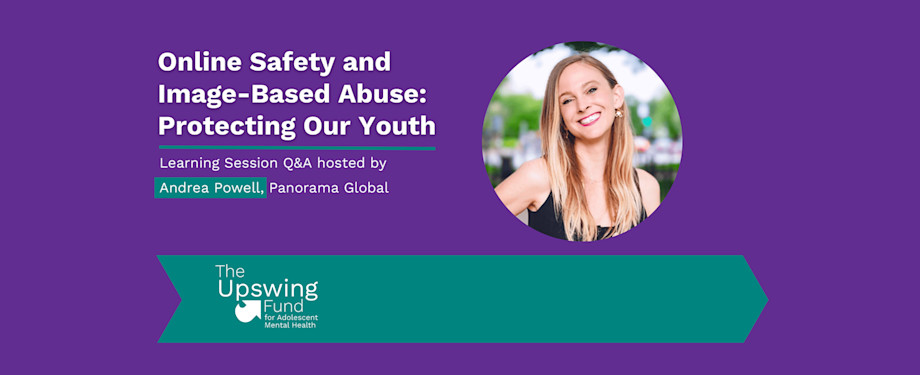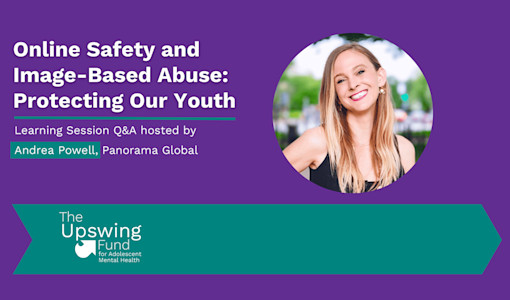

March 01, 2023 | Resources
Online Safety and Image-Based Abuse: Protecting Our Youth
Learning Session Q&A hosted by Andrea Powell, Panorama Global
In recent years, online harm and image-based abuse against young people have become alarmingly prevalent, as access to technology has increased in parallel with isolation, targeted victimization of marginalized groups, and overall challenges to mental health. With easier access comes increased incidence of unwarranted threats such as human trafficking and victim perpetration online; thus, targeting the most vulnerable.
The topic of online safety for our youth is top of mind now more than ever as the mental health community reflects on recent findings by the CDC that show:
- Nearly 3 in 5 U.S. teen girls (57%) feel sad or depressed due to increased incidence of abuse, trauma, depression, and victimization.
- LGBTQ+ youth are still facing high levels of mistreatment and are likely to be victims of violence.
- There has been a staggering increase in sexual violence against minors. In fact, 1 in 5 teen girls are subjected to sexual assault and 1 in 3 have considered self-harm, according to the CDC.
Undoubtedly, these figures should concern us all and are a call to action to improve and expand efforts to protect youth and increase access to treatment across the country.
As part of a continued effort to provide resources to our partners, The Upswing Fund recently invited Andrea Powell, Director of the Image-based Sexual Abuse Initiative at Panorama Global to host a Q&A-style Learning Session on National Human Trafficking Awareness Day. At the session, Andrea discussed and answered questions on how image-based abuse can impact youth mental health, how community-based mental health organizations can be prepared, and how to look for warning signs.
Andrea was joined by Leah Juliett, an award-winning LGBTQ+ activist, author, and survivor-centered storyteller to answer questions from Upswing partners.
Due to the sensitive nature of this topic, only select clips and quotes from the Learning Session have been made public.
How can community-based mental health organizations position themselves to report incidents of online abuse?
“Image-based sexual abuse is taking someone’s power. Much like other forms of sexual assault or abuse, the intent is to dehumanize, shame, and have power over victims.” – Andrea
- Andrea recommends working with the National Center for Missing and Exploited Children to file a report.
- Including the young person in the process of reporting can repair some of the damage of dehumanization and control that they have experienced by giving back some of their power and agency.
What do good school policies look like for addressing incidents and holding underage perpetrators accountable?
“The issue is going to keep happening until we deconstruct the systems that are allowing the violence to continue.” – Leah
- Federal legislation criminalizing image-based abuse—while important—only focuses on the perpetrators and perpetuates existing racial disparities in prisons.
- A culture shift is needed to center victims.
- In parallel, we need to equip young people with resources and tools so that they do not feel like they must hurt others in order to feel better about themselves.
What does restorative justice in this field look like
"You have to be able to have a conversation to unpack why 10-year-old boys felt like this is something that they could or should be able to do." – Andrea
- While vital, restorative justice is not prevalent in this field.
- It is common for victims and perpetrators to know each other, which makes it challenging to navigate healing conversations.
- Accountability is important, but it is also important for it not to be purely punitive.
Who is vulnerable to image-based abuse?
"Folks who are vulnerable to injustice, folks who are economically disempowered, folks who don't have community or a safe home, will seek that refuge in either someone else or a stranger." – Leah
-
This issue applies to all young people. Bullying is everywhere and it has become exacerbated online. However, individuals experiencing other vulnerabilities and injustices are more likely to seek out community online.
-
The internet can be a powerful tool for building community, particularly for LGBTQ+ and other youth who may not have physical access to safe, representative community in "real life."
-
The key to prevention is equipping young people with the tools to navigate online spaces in a safe way.
-
Mental health support is critical to building a foundation of community where young people feel safe.
What is the best way to reach youth about this topic?
"Having someone that you can see yourself reflected in, that you know has similar experiences to you, will resonate so much more substantially." – Leah
- Representation and relatability are important when creating programming that will resonate with youth. This is particularly true for LGBTQ+ youth.
- Young people need to be equipped with resources early. There is a widespread perspective that this topic is too mature for young audiences. However, these issues are starting in elementary school.
What warning signs or red flags that community leaders should be aware of?
"If we take a moment to center our students and listen to what's happening, often times we can really easily pinpoint those students who may be going through something and who may be experiencing some form of online harassment outside of school." – Leah
Significant red flags of potential image-based abuse in young people include:
- Isolating in "real life" as well as social media
- Creation of 8 or more social media accounts
- Warning signs of image-based abuse are similar to those of suicidal ideation, depression, anxiety, and shame.
- For those in a school or community organization, it's critical to shift awareness and pay attention to the ways in which peers are treating other students.
- Trouble at school is often indicative of trouble happening online or at home.
Resources & Further Reading
- I Didn't Consent: A Global Landscape Report on Image Based Sexual Abuse (IBSA Initiative, Panorama Global, February 2022). This first publication of the IBSA Initiative brings forth the knowledge and experience of 20 survivors of image abuse, 50+ global policy, advocacy, direct service, academic, and tech leaders from 19 countries with recommendations from survivors across eight countries.
- CDC Youth Risk Behavior Survey 2011-2021 (CDC, February 2022)
- National Center for Missing and Exploited Children
About Andrea
Andrea Powell is the Director of the Image-based Sexual Abuse (IBSA) Initiative at Panorama Global. In this role, Andrea is responsible for building partnerships and mobilizing efforts towards the vision of a world where no one experiences the enduring trauma that results from image-based abuse and other types of online harm.
For the past 18 years, Andrea has led national and international efforts to develop services, housing, and policies to advance the rights and healing of survivors of human trafficking, sexual exploitation, and sexual abuse. In 2004, Andrea co-founded FAIR Girls, where she led her team for 14 years in providing case management services and establishing a safe home for survivors in Washington, D.C, and played a leadership role with the DC Human Trafficking Task Force. At Karana Rising, co-founded by Andrea in 2019, survivors lead to advance justice and healing with and for survivors who have experienced arrest and incarceration as a result of their own trafficking. Through these efforts, Andrea has served and interfaced with over 2,000 survivors of trafficking and gender-based violence in the United States, the Balkans, Russia, Bangladesh, India, and Uganda.
About Leah
Leah Juliett (they/them) is an award-winning writer, speaker, organizer, activist, author, nonprofit leader, and communications consultant from Connecticut. Leah is the Founder and Executive Director of March Against Revenge Porn, an international advocacy campaign and nonprofit organization dedicated to eradicating technology-based sexual abuse through national protest marches, legislative action, victim support services, media advocacy, and survivor storytelling. Leah is also the Founder and Chief Storyteller of Survivor Social Media LLC, a social media marketing and digital storytelling agency helping powerful people tell powerful stories.
Leah's first book, NAKED IN PUBLIC, was released in January 2022 and is an LGBTQ+ poetry bestseller. Leah has delivered two TED talks: "How I Survived Revenge Porn" and "Reclaim Shame" which have been featured on the public TED page and shared worldwide.









